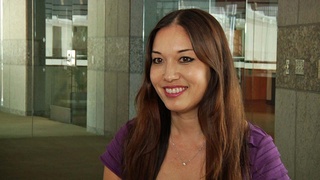Interviews
Defining the term "Nikkei" (Portuguese)
(Portuguese) The term Nikkei, to me, encompasses a lot. I’d say that it’s a very complicated term. Why? Because it brings together the aspect, you know, not just of your appearance, but really your whole life. Cultural life, family life that you learned from your grandparents, from your parents, and that’s internalized. And then, with all of that Japanese culture – we should say half-Japanese, right, because it’s not purely Japanese either – you enter into society, and there you have to combine these two parts, these two cultures, Brazilian and Japanese. So, I think that the term Nikkei, for me personally, is a term that demands, or that demands of me that I live the Japanese part and the Brazilian part, which isn’t always possible, you know, for people to maintain such a nice harmony. Sometimes people experience moments of great conflict.
Date: October 7, 2005
Location: California, US
Interviewer: Ann Kaneko
Contributed by: Watase Media Arts Center, Japanese American National Museum.
Explore More Videos




Postwar school-life
(b. 1930) Half Japanese and grew up in both Japan and the United States.

On Challenging Institutions
(1938-2020) Japanese American attorney and civil rights activist

Pop and Balls
(1938-2020) Japanese American attorney and civil rights activist


Re-examining Identity
(1941-2018) Japanese Canadian photojournalist and activist

Fitting in to both sides of her family
Jewish Japanese American journalist




Conflicted about immigrating to America (Japanese)
(b. 1925) War bride

Defining "Nikkei"
(1941-2018) Japanese Canadian photojournalist and activist

The term Nikkei (Japanese)
(b. 1979) Sansei Nikkei Brazilian who lives in Oizumi-machi in Gunma prefecture. He runs his own design studio.
